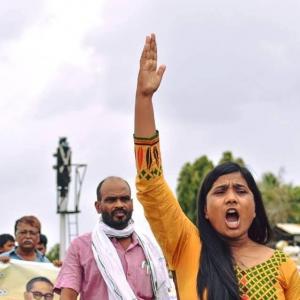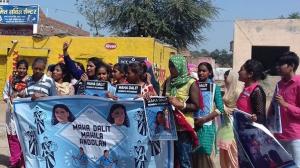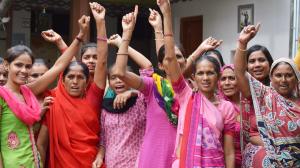India’s justice system is failing survivors of caste-based sexual violence
A new report calls on the Indian government to improve access to justice for Dalit women and girl who have been subjected to caste-based sexual violence.
Justice Denied: Sexual Violence & Intersectional Discrimination - Barriers to Accessing Justice for Dalit Women and Girls in Haryana, India, examines 40 rape cases involving women and girls from the Dalit community in India's northern state of Haryana.
The report was produced in collaboration between Swabhiman Society, a grassroots organisation led by Dalit women, and international women's rights organisation Equality Now, and includes recommendations for the state and national government on tackling caste-based sexual violence.
According to government data, around ten Dalit women and girls are raped daily across India. However, the real figure is estimated to be far higher as only a small proportion of crimes are reported, and conviction rates remain abysmally low.
The Dalit community resides at the lowest rung of India's caste hierarchy – a class system that categorises people into groups and imposes a rigid social status.
The Indian constitution guarantees the right to equality and equal protection of the law and forbids discrimination on the basis of religion, race, caste, sex or place of birth. However, our research has uncovered systemic problems with prejudice, patriarchy, and corruption.
Only 10% of cases examined ended with the successful conviction of all those charged, and this was just with particularly abhorrent crimes involving a victim who was murdered or under age six.
In almost 90% of cases, at least one of the accused was from a dominant caste. Perpetrators often acted in groups and attacks tended to incorporate more severe forms of sexual violence, including gang-rape and murder.
The police frequently failed to record or investigate crimes when initially reported and were sometimes abusive or put pressure on survivors to drop cases. Survivors were not given adequate advice about their legal rights, and some did not receive compensation payments they were entitled to.
Survivors, family members, and witnesses also faced threats, coercion, and bribery from perpetrators and members of the wider community seeking to stop prosecutions. In almost 60% of cases, the survivor or her family was pressured into withdrawing from pursuing a legal case and had to accept a ‘compromise’ settlement outside the legal system.
In over 80% of the cases, village councils (known as khap panchayats) attempted to interfere with the justice process by using their economic, social and political power to threaten, intimidate and coerce survivors and family members.
Equality Now's Eurasia Director Jacqui Hunt explains: "Dalit women's bodies are being used to assert caste supremacy and keep women "in their place". Perpetrators from dominant castes know they are likely to go unpunished because every branch and echelon of the system is weighted in their favour, and this impunity for rape creates an enabling environment that fosters further abuse."
Manisha Mashaal, founder of Swabhiman Society, states: "One of the biggest challenges in cases of sexual violence is that survivors or the families are pressured into compromises with the accused. Community and social pressure play a major role in impeding access to justice in such cases. Another issue is the lack of quality and effective systems in place to provide the survivors of violence and their families with immediate social, legal and mental health support along with proper and timely rehabilitation."
"It is critical that the barriers to justice faced by Dalit women and girls at the ground level are brought to the attention of our society and government so that caste-based violence is recognised, space is created for Dalit voices to be heard, and collective action is taken towards ensuring justice for survivors and their families."
ENDS
About Swabhiman Society: Swabhiman Society is an organisation led by and comprised of young Dalit women, created with the goal of uniting and organising Dalit women in Haryana to end caste-based oppression at the grassroots level. Since 2012, Swabhiman Society has provided paralegal support and legal aid to survivors of sexual violence from marginalised communities, and works against oppression and injustice towards Dalit, Muslim and trans women and girls in Haryana. In addition to our work seeking justice for survivors of sexual violence, Swabhiman Society works to empower Dalit women and girls and create strong, self-reliant leaders within the community.
About Equality Now: Founded in 1992, Equality Now is an international human rights organisation that works to protect and promote the rights of all women and girls around the world. Our campaigns are centred on four programme areas: Legal Equality, End Sexual Violence, End Harmful Practices, and End Sex Trafficking, with a cross-cutting focus on the unique needs of adolescent girls. Equality Now combines grassroots activism with international, regional and national legal advocacy to achieve legal and systemic change to benefit all women and girls, and works to ensure that governments enact and enforce laws and policies that uphold their rights.
Tara Carey
Equality Now
+44 7971 556340
email us here
Legal Disclaimer:
EIN Presswire provides this news content "as is" without warranty of any kind. We do not accept any responsibility or liability for the accuracy, content, images, videos, licenses, completeness, legality, or reliability of the information contained in this article. If you have any complaints or copyright issues related to this article, kindly contact the author above.



